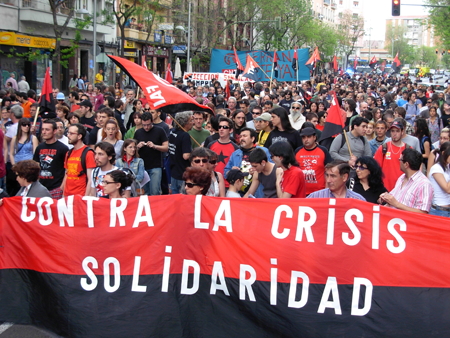Spain is not Greece, as everyone I meet here assures me.
However, the violent clashes in the streets of Madrid, Valencia and Barcelona over the introduction of labour reforms that would make it easier to fire workers still hang in the air here. April 29 saw demonstrations organized by the PSOE (the main left wing political party in Spain) in conjunction with trade unions. Forty thousand people were out on the streets of Madrid, and there were smaller but no less heartfelt demonstrations in at least 55 cities, towns and villages ranging from Avila to Zamora.
Austerity hurts
The series of “No Se Juega con la Educacion y la Sanidad” (loosely translated: “Don’t Play Games with Education and Healthcare”) protests were organized by major trade union centrals like the UGT and the Comisiones Obreras.
As in Canada, the austerity agenda hits hardest at public services and those who are most at risk are children, pensioners and the unemployed.
There is a reason why the Indignados movement began here in Spain, or perhaps there are many reasons. Everywhere, there are signs that the recession has hit hard in Spain. These include the signs proclaiming flats for rent and sale, as many of the British and German retirees have packed up and gone back where they came from, leaving behind unbought villas in vast sprawling “urbanizations” alongside offices and buildings that clearly once housed small industries.
Store windows are shuttered, small towns have a neglected air and young men lounge on street corners with that air of having nowhere in particular to be at any given time. Unemployment is high – 20 per cent according to some economists, up to 40 per cent for young people – and the right-wing central government of Mariano Rajoy is more focussed on cutting spending than on creating jobs.
Then there are the traditional tensions between the North and the South, between Spaniards and migrant workers, mainly from North Africa. The latest round of cuts that have been announced by the Rajoy government includes an additional 10 billion euros (over $13 billion Cdn) in direct cuts to education and health care.
These cuts make no sense, as young mediator Marta Junquera assures me: “Can you imagine the damage that cutting 10,000 million euros will do to our schools and hospitals, especially when social services are so needed in times of crisis?” She notes that society is “stretching out, individually and collectively to support families and groups that are the most vulnerable to the cuts.” Junquera concludes, “We need to create a real, friendly and multicultural citizenship in Spain, that is resilant to change and crisis.”
As an outsider, I cannot help but be struck by the similarity of the right-wing attack machine. Spain has recently raised the retirement age from 65 to 67 outright and had electronic suveillance legislaton introduced. Spain’s public sector – especially health care and education – is under threat; its unions and workers are being threatened by unfair legislation; migrant workers and immigrants are targets of right-wing rhetoric; students and youth are watching tuition rise while jobs are evaporating; and the hard-won legislative authority of its autonomous regions is being encroached upon by the central government.
Vibrant and diverse resistance
However, there is also a vibrant resistance movement here. Local media reports that between six and eight million people here have participated in the many demonstrations and protests that have been organized, from those called by “Los Abuelos” (the grandparents), to those organized by the mainstream unions and PSOE, or the Indignados (the 15-M Movement and Democracia Real Ya), who reject electoral politics in favour of a call to a total transformation of society.
There are many strands to these protests but they do share a common interest in pushng back against austerity. Only time will tell what impact they will have upon their country.
There are calls for massive May Day demonstrations, to draw a line in the sand about the kind of Spain people want to live in. May 1 has been the traditional day that workers take to the streets here. As the curtain rises on this year’s Dia del Trabajo, it remains to be seen what impacts the cuts will have on the spirits of the people.
Archana Rampure works as a researcher for the Canadian Union of Public Employees.



